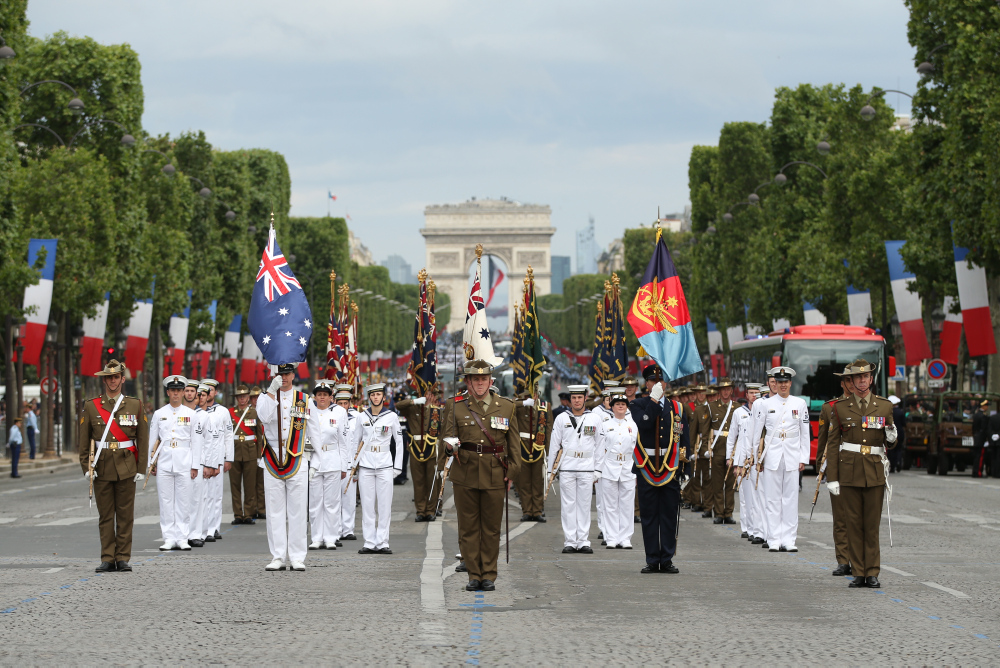
Australia’s foreign policy and defence white papers, launched over the past 18 months, are notable in describing a complex and uncertain global environment and our commitment to the values of the rule of law, human rights and democracy, and working collaboratively with partners.
These foundation documents sit comfortably with the evolving bilateral relationship between Australia and France—two liberal democratic countries with global outlooks and a shared sense of global responsibility. We’re also neighbours, with maritime borders in the Coral Sea and the Southern Ocean.
In our focus on what is closest and most urgent, however, it’s often challenging for Canberra and Paris to find an opportunity to explore the relationship more deeply. Though we’re involved in complementary activities and neighbouring regions, there’s rarely a need to manage bilateral issues or focus particular attention on each other.
Last year’s announcement that Australia would partner with French company DCNS—now Naval Group—to develop Australia’s future submarine capability caused many in both countries to look with renewed focus at the bilateral relationship. Modern military capability is about much more than ‘cutting steel’—it’s about collaborating on weapons, communications and intelligence and putting those capabilities into practice through exercises and operations.
With that in mind, ASPI’s new Strategy report,
More than submarines: new dimensions in the Australia–France strategic partnership, aims to enhance our understanding of this valuable and productive bilateral relationship and assist in navigating the way forward.
Bringing together views from Australian and French officials, academics and practitioners, the report explores Australia–France ties through the key dimensions of history, international security, defence and geography.
Graeme Dobell looks at the tension in mutual comprehension that provided the backdrop to relations in the Pacific until the 1990s, while Theodore Ell observes that the welcome rapprochement of recent years nonetheless requires investment on both sides in developing and delivering a shared strategic approach to managing the relationship.
In affirming the common world view of the two countries, Nicolas Regaud argues for increased understanding of those commonalities across Australian and French societies. He underscores the excellent work already undertaken on security issues and the opportunities to reinforce commitments by both countries to balance security with freedom.
Lisa Sharland and I continue with that theme, calling for closer collaboration and joint leadership on global security matters, championing multilateralism and utilising each other as regional experts on shared global problems. There’s also a note of caution: 2017’s ‘Joint statement of enhanced strategic partnership between Australia and France’ recognises shared interests but has an ambitious program of activity requiring an equally strong commitment to implementation.
Rupert Hoskin and Virginie Saliou demonstrate that military cooperation—from disaster relief and maritime law enforcement in the Pacific to joint action and mutual assistance in the Iraq–Syria conflict and future capability—is the area of greatest bilateral activity. Their analysis shows that the strength of the bond in this area goes beyond a shared world view to a readiness to engage with operational and tactical risk.
There’s a need for careful management, however, in the area where Australia’s and France’s interests are closest: the Indo-Pacific. Paul Soyez and Denise Fisher make a compelling case for the two countries to look beyond the known shared interests and take the time to truly understand each other’s intentions and develop complementary approaches to promoting stability and security in the region. France’s engagement in the Indian Ocean and the South Pacific—including multilateral forums—is overwhelmingly beneficial for the future of these regions, and it’s in Australia’s interest to ensure that it continues.
What emerges from this exploration of the Australia–France relationship is a rich and complex picture of two vibrant and activist countries, each grappling with complex problems but determined to contribute to making a safer and more just world.
It’s also clear that maximising the benefits of the bilateral relationship requires both a long-term strategic plan and a practical commitment to getting things done. To do otherwise risks being caught in the limitations of language, geography, different legal systems and different operational and security cultures and practices.
At a time when the international order appears to be under threat, the willingness of our two countries to continue to commit to the global rule of law and strengthening the liberal order and respect for human rights is both heartening and vital.
[1] More than submarines: new dimensions in the Australia–France strategic partnership: https://www.aspi.org.au/report/australia-france-strategic-partnership
 Print This Post
Print This Post